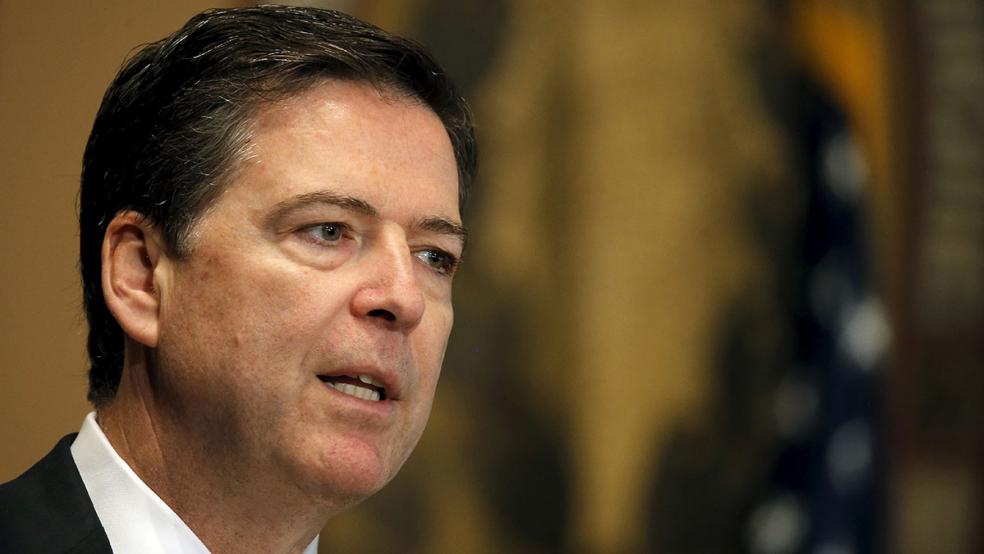FBI Director James Comey on Friday threw Democrats, and more than a few Republicans, into a state of inchoate rage with his controversial decision to tell Congress -- and by extension, the rest of the planet -- about the discovery of a cache of emails sent to or from the private email server Democratic presidential candidate Hillary Clinton used while secretary of state.
It was an unprecedented thing for an FBI director, or any employee of the Department of Justice, to do, and Clinton supporters in particular were furious. The FBI generally never comments on the status of investigations. And the Justice Department has a generations-long policy of taking no action that might impact an election in the 60 days prior to the contest.
Related: Emails Return to Haunt Clinton in Election’s Final Days
Comey did not, himself, release the information. He simply sent a letter to members of relevant Congressional committees, which was the functional equivalent of posting it to Facebook. The vague and detail-free missive was later fleshed out by a flood of anonymous sources in his own organization.
It turned out that while investigating an unrelated case -- the accusation that former Democratic congressman from New York, Anthony Weiner, had sent sexually explicit text messages to a minor -- agents came across a large number of emails to and from Huma Abedin, Weiner’s estranged wife. Abedin, a top aide to Clinton apparently shared the laptop and used it to access emails that moved across Clinton’s private server.
By Sunday, the unfocused anger had sharpened into a growing chorus of claims that Comey, by revealing that investigators had found the emails, had actually violated a federal law known as the Hatch Act.
To be clear from the start, it is far from certain that the FBI director actually violated that 1939 statute meant to prevent executive branch employees from engaging in political activity related to elections. But there are some very influential figures on both sides of the traditional Democrat-Republican split arguing that he did.
Related: Leaked Memo Shows Clinton Foundation’s Tangled Web of Money and Favors
The Hatch Act was passed as a reaction to reports of Democratic officials in the Franklin Delano Roosevelt administration using people employed under the Depression-era Works Progress Administration to influence the outcome of the 1938 elections.
The law, passed in 1939 (as An Act to Prevent Pernicious Political Activities) was named for its sponsor, Democrat Carl Hatch, a senator from New Mexico.
Since revised and amended a number of times, the main function of the law is, in general, to prohibit most high-level federal employees from taking actions likely to affect the outcome of a partisan election. In particular, it prevents government employees from using their positions to engage in political activity and from pressuring underlings into supporting a particular candidate.
Enforcement of the law is the responsibility of the US Office of Special Counsel, an independent agency set up to “safeguard the merit system by protecting federal employees and applicants from prohibited personnel practices, especially reprisal for whistleblowing.”
Related: Conservative Support Grows to Block Clinton SCOTUS Nominees
That agency is now being dragged into the controversy over Comey’s decision to make the discovery of the Abedin emails public.
In an article published in The New York Times on Sunday, Richard W. Painter announced that he had filed a complaint against the FBI with the OSC and the Office of Government Ethics. Painter is no Democratic partisan -- he was chief White House ethics lawyer during the final two years of the George W. Bush administration.
(A Republican, Painter says that he supported multiple GOP candidates throughout the 2016 primary, but switched his allegiance to Clinton after Trump won the party’s nomination.)
“It is not clear whether Mr. Comey personally wanted to influence the outcome of the election, although his letter — which cast suspicion on Mrs. Clinton without revealing specifics — was concerning,” Painter wrote.
Related: Does Trump Really Still Have a Shot?
“But an official doesn’t need to have a specific intent — or desire — to influence an election to be in violation of the Hatch Act or government ethics rules. The rules are violated if it is obvious that the official’s actions could influence the election, there is no other good reason for taking those actions, and the official is acting under pressure from persons who obviously do want to influence the election.”
How valid Painter’s claim is will have to be tested by the OSC, and perhaps by the courts. But that isn’t going to stop Democrats from piling on, as Senate Minority Leader Harry Reid did on Sunday.
In a public letter to Comey, he described the FBI director’s actions as “a clear intent to aid one political party over another.” He followed that up with a highly qualified warning: “I am writing to inform you that my office has determined that these actions may violate the Hatch Act, which bars FBI officials from using their official authority to influence an election. Through your partisan actions, you may have broken the law.”
The Reid letter goes on to essentially accuse Comey of sheltering Trump from accusations that his candidacy is backed by the Russian government while publicizing information damaging to Clinton.
Comey, according to reports, plans to remain silent on these issues during the remainder of the election, which takes place in eight days. But growing pressure from Democratic lawmakers may make that silence difficult to maintain.





